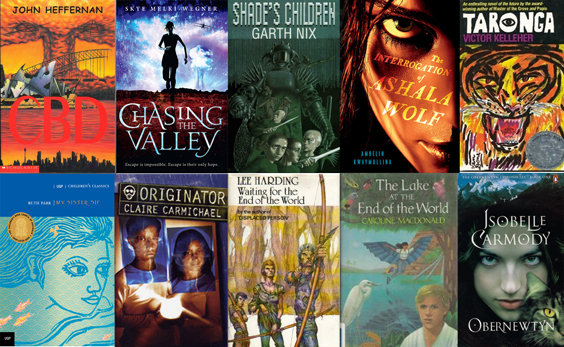10 Australian YA Dystopian/End of the World Novels Not To Be Missed
 Ah, definitions, definitions, definitions! It’s always the way with genre fiction that we have to grapple with definitions and borders and ruling in and ruling out. It’s funny how mainstream fiction doesn’t get all het up about things like, but that’s an issue for another day.
Ah, definitions, definitions, definitions! It’s always the way with genre fiction that we have to grapple with definitions and borders and ruling in and ruling out. It’s funny how mainstream fiction doesn’t get all het up about things like, but that’s an issue for another day.
This selection of ten superb Australian YA fiction titles is probably more of a grab bag than the last few I’ve done (see here and here) but that’s the nature of the beast. I’m possibly conflating two sub-genres here but they go together so naturally, and there are so many overlaps and titles on the border but I’m happy to live with this. The grand tradition of the End of the World novel and the grand tradition of the post-apocalyptic Dystopian novel are well represented in Australian YA fiction, with standout series like John Marsden’s Tomorrow When the War Began opus, but I’m spreading the net wide and I hope to introduce some titles that you might be unaware of, or titles that have been unjustly neglected.
In short, if you like The Hunger Games or Divergent or The Maze Runner you might like to try these sensational books.
For more on each of them, follow the hyperlinks.
CBD – John Heffernan (2000). Twenty-third century Sydney is in ruins, and long hidden stories might point the way to escape from an oppressive society. Dark and absorbing.
My Sister Sif – Ruth Park (1986). Is the world ending or is it just in really bad shape? ClifFi ahead of its time. Lyrical and dreamlike.
Taronga – Victor Kelleher (1986). It helps to survive in a post-apocalyptic world if you can talk to and befriend animals. Groundbreaking and iconic.
The Interrogation of Ashala Wolf – Ambelin Kwaymullina (2013). Post-apocalyptic mind powers, repressive dictatorship, hidden secrets to be uncovered, rebels and underground resistance. What’s not to like? Punchy and refreshing.
Originator – Claire Carmichael (1998). Plagues have decimated the world and society is rigidly stratified, and our heroes are rebels. Pacey and challenging.
Shade’s Children – Garth Nix (1997). In an unhappy future where no adults exist 14-year-olds are harvested for their parts, which is pretty dystopic. Grim and clever.
Waiting for the End of the World – Lee Harding (1983). In the chaos following the collapse of society, fleeing to the hills to escape the rising tyranny looks like a solution. Gritty and thoughtful.
The Lake at the End of the World – Caroline MacDonald (1988). In a post-nuclear holocaust world survival is complicated by the entrenched beliefs of cults. Farseeing and moving.
Chasing the Valley – Skye Melki-Wegner (2013). Power struggles in a dystopic world full of clever magic and esoteric technology. Lively and original.
Obernewtyn – Isobelle Carmody (1987). After the apocalypse outcasts and misfits struggle for freedom. Intense and compelling.
As usual, modesty forbids me including my end of the worlder, Blackout (2000), but if you’d like to see what happens to society when all electricity stops, I’m not going to stand in your way :-).